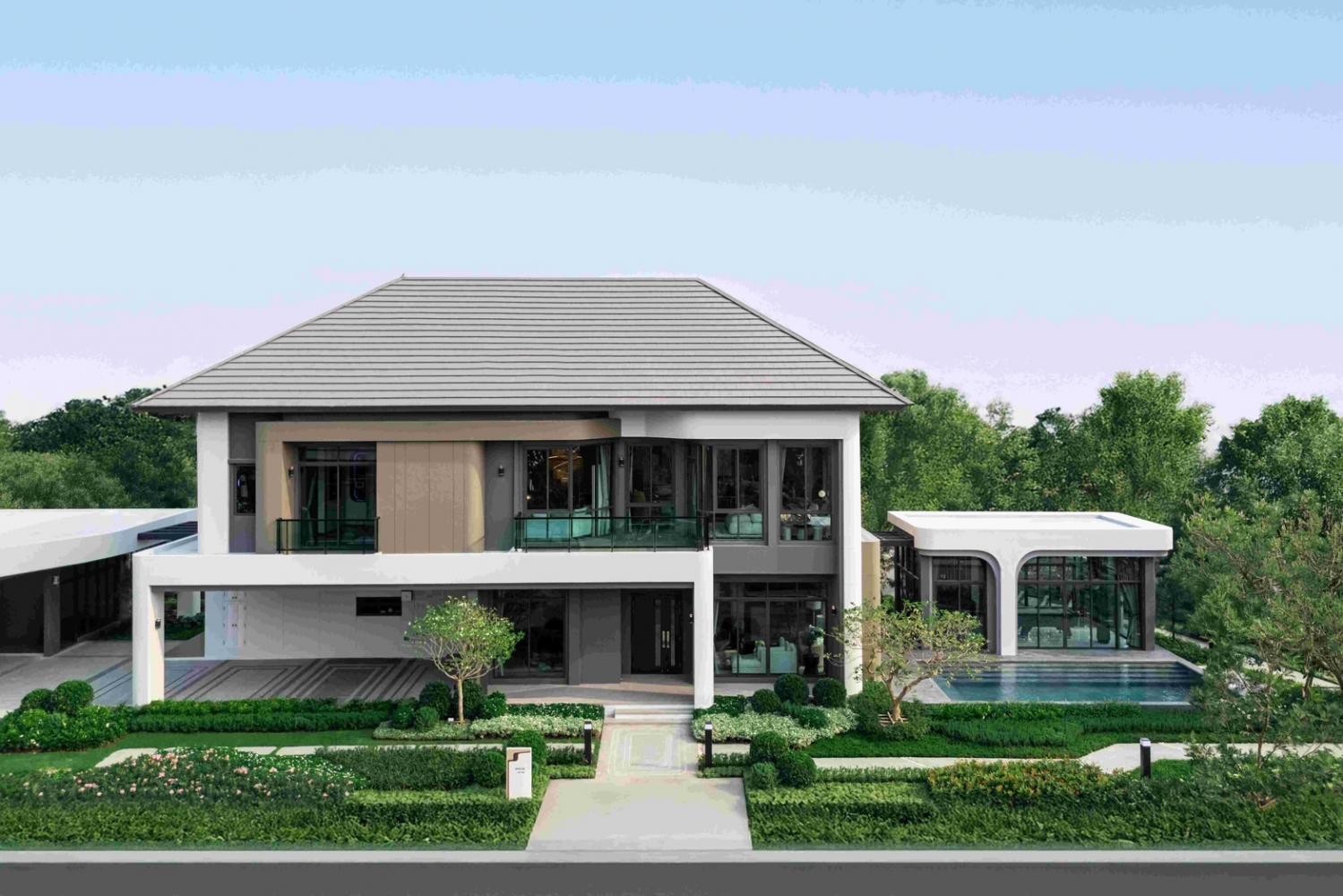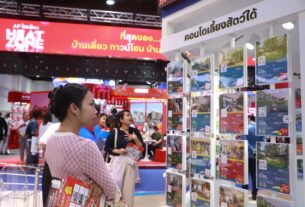An artist’s rendition shows a single detached house at Bangkok Boulevard Changwattana-Chaiyapruek, with unit prices starting at 9.59 million baht. In Bangkok’s property landscape, SC Asset Corporation, a SET-listed developer, is sticking to its 2025 targets for presales, revenue, and new project launches, despite a market that remains unfavourable and where large players are expected to capture a bigger slice of demand. The company highlights a shift in buyer interest toward large, reliable developers in a market that has seen a narrowing field of active competitors. Executives emphasize that only a handful of residential developers continue to attract buyers and maintain sales momentum, while others have seen declines, and banks leaning toward mortgages are prioritizing the major players. Against this backdrop, SC Asset confirms plans to press ahead with ambitious activity in 2025, including a substantial project slate and a clear revenue trajectory.
SC Asset’s 2025 Outlook and Market Position
SC Asset’s leadership has reiterated confidence in achieving its 2025 targets, underscoring a strategy that aligns project launches, presales momentum, and revenue generation with a market environment that remains challenging for many developers. The company plans to launch 15 residential projects in 2025, with a cumulative value of around 28 billion baht. This robust launch pipeline is designed to sustain presales and revenue generation targets, which are projected at 26 billion baht in presales and 25 billion baht in revenue for the year. The emphasis on a sizable release calendar reflects SC Asset’s belief that quality and scale can still win buyers even when sentiment is fragile. Moreover, the plan to drive sales through targeted campaigns and strategic promotions indicates a multichannel approach to sustaining demand in a market that is increasingly selective and price-sensitive.
The market context remains a critical factor for SC Asset’s strategy. Analysts and stakeholders note that the current environment features a concentration of demand among large, well-capitalized developers who can offer perceived reliability and scale. The presence of banks that prioritize lending to top players further reinforces the advantage enjoyed by the largest developers, creating a moat around brand strength and access to financing. In this dynamic, SC Asset’s emphasis on a strong project pipeline and disciplined pricing appears designed to maintain competitiveness while preserving margins. The company’s leadership indicates that even amid headwinds, there is room for calibrated growth through high-quality projects that align with buyer expectations for location, design, and long-term value.
To activate walk-in traffic and accelerate revenue recognition, SC Asset has outlined a targeted in-person promotional push. A six-day promotional campaign is slated for Siam Paragon, a premier shopping destination, with a sales objective of 1.5 billion baht. The strategic timing of this event is intended to generate a surge of interested buyers and convert visits into concrete transfers, which are crucial for recording revenue in the second quarter. The plan suggests a deliberate approach to balancing marketing expenditure with the need to realise revenue in a tight fiscal window, especially given the earlier year’s volatility in site visits driven by macroeconomic developments.
Executive commentary from SC Asset emphasizes that even as market sentiment remains constrained, certain segments of the property market show resilience. The company points to continued demand for low-rise housing, which has historically lived alongside a strong segment of high-rise condos in Bangkok. The leadership notes that macro factors, including global economic shifts, affect buyer sentiment and project choices, but the appeal of well-located, well-designed housing remains a persistent driver of demand. The message is that SC Asset intends to leverage its proven development capability and market position to navigate a market where buyer confidence can be fragile, yet opportunities persist for genuinely competitive offerings.
In addition to the pipeline and marketing initiatives, SC Asset’s management highlights a continued focus on operational efficiency and project execution. The goal is to deliver a steady stream of completed projects and timely handovers, which underpin presales performance and builders’ confidence in the company’s ability to manage risk and cash flow. The company also appears to be mindful of the need to adapt to evolving buyer preferences, including a potential shift toward larger, more established developers who offer perceived stability, financing support, and a track record of successful completions. Overall, SC Asset’s 2025 plan signals a disciplined expansion mantra anchored in a strong project lineup and targeted sales acceleration to meet its stated financial targets.
Low-Rise Housing Market: Demand Dynamics and Buyer Behavior
The low-rise housing segment has shown a pattern of slowing at the start of the year, followed by a modest revival as buyers recalibrate their expectations and assess the affordability and value propositions of different developments. In January, the market experienced a notable slowdown, but activity improved in February and March as buyers returned with greater confidence, reflecting seasonal demand and the alignment of project timelines with purchasing windows. This uptick in activity occurs even as broader market sentiment remains cautious, balancing the positive momentum from new launches with the pressure of mortgage financing and price growth expectations.
A key factor shaping buyer behavior in the current climate is the evolving mortgage landscape. Financial institutions are increasingly oriented toward larger, more established developers with proven track records, which in turn influences which projects gain traction. The emphasis on accessibility to credit and the perceived risk profile of borrowers has contributed to a market environment where credibility and scale serve as critical differentiators among developers. In this context, buyers looking for long-term value may lean toward developers that demonstrate financial stability, reliable supply chains, and strong after-sales support. This trend intersects with the strategic decisions of developers to prioritize the completion of high-quality projects and transparent delivery timelines, which collectively contribute to buyer confidence and project uptake.
Market observers note that the shift toward large, established players is not just a matter of brand recognition; it also reflects practical considerations around financing, risk, and project viability. When buyers face uncertainty about macroeconomic conditions, they tend to favor developers who can demonstrate resilience through diversified project portfolios, robust capital structures, and a solid track record of meeting commitments. The convergence of buyer preference, financing dynamics, and the competitive landscape reinforces the centrality of scale and credibility in Bangkok’s housing market. For SC Asset, these market dynamics underscore the importance of maintaining a steady cadence of well-paced launches and ensuring that each project demonstrates clear value propositions, whether through location, design, or potential for long-term appreciation.
To stimulate walk-in traffic and convert interest into sales, SC Asset has initiated an on-site promotional push tied to a broader effort to capture a larger share of the market. The six-day Siam Paragon campaign aims to activate footfall and translate it into tangible sales, with the expectation that a portion of this traffic will convert into unit transfers that can be recognized as revenue in the second quarter. The strategy reflects a careful balance between marketing expenditure and revenue timing, recognizing the importance of aligning promotional activities with procurement cycles and the availability of transferrable units. In addition, the company’s planning suggests a recognition-friendly approach, ensuring that the sale process aligns with accounting requirements for revenue recognition while also delivering a compelling value proposition for potential buyers.
The low-rise segment was also shaped by external events that tested buyer confidence. A strong earthquake in late March, felt across Bangkok, caused concern among residents and could influence the decisions of prospective buyers considering move-in readiness and safety standards. However, company executives observed that the impact on the low-rise market was limited relative to broader economic sentiment. For instance, the earthquake did not trigger a widespread shift away from housing purchases; rather, it prompted some buyers to reassess their immediate housing needs and, in certain cases, consider the safety and resilience of specific properties or layouts. This nuance demonstrates how buyers weigh structural integrity, building codes, and safety features, particularly in the wake of natural events, when evaluating potential purchases in the mid to long term.
In a notable anecdote reflecting buyer behavior during periods of stress, some condo residents reported temporarily relocating by purchasing high-end low-rise houses within SC Asset’s portfolio as backup homes. This response underscores a tendency among buyers to diversify their housing exposure—maintaining options across asset classes to mitigate risk and ensure accessibility during emergencies. The incident also highlights a broader trend in Thailand’s property market, where buyers increasingly look for flexibility, resilience, and security in their investments, especially in a market characterized by macro volatility and evolving regulatory conditions.
Foreign demand emerged as a distinct and influential factor in the condo segment, particularly for high-rise units. While domestic buyers faced an altered sentiment in the wake of the earthquake, foreign buyers showed resilience, with particular interest from buyers from Taiwan and Myanmar. These buyers focused on locations such as Rama IX and Ekamai roads, indicating a preference for areas with strong connectivity, urban amenities, and potential for capital appreciation. The sustained interest from foreign buyers underscores Bangkok’s appeal as a cosmopolitan city with diverse demand drivers, even as local sentiment fluctuates. Developers have shown heightened attention to international demand, seeking to diversify their buyer base and reduce reliance on a single market segment.
In response to policy shifts, the easing of loan-to-value (LTV) limits is a notable development for the condo segment. With the new LTV measures taking effect this month, SC Asset anticipates a more favorable financing environment that could help clear the remaining condo inventory worth approximately 2 billion baht within the year. The combination of improved access to credit for buyers and a more liquid inventory position may support higher transaction volumes and faster turnover for condo projects, potentially offsetting softer demand in other sectors. This expectation aligns with a broader strategy to balance the portfolio by accelerating pre-sales and delivering revenue recognition from condo units that are near completion or ready for transfer.
High-Rise Condominiums: Foreign Demand and Regional Preferences
The high-rise condo market in Bangkok continues to attract steady interest from international buyers, even as local demand experiences ebbs and flows in the wake of external shocks. The earthquake’s impact appeared to be more muted for foreign buyers, who tend to have a higher tolerance for risk and a greater familiarity with disaster scenarios in some markets. As foreign buyers navigate the city’s condo offerings, certain neighborhoods have emerged as particularly attractive due to their accessibility, lifestyle amenities, and proximity to business districts. The dynamics of foreign demand underscore Bangkok’s ongoing status as a magnetic hub for international capital seeking stable, well-located asset classes.
Among the locations drawing foreign attention, Rama IX and Ekamai roads have stood out as focal points for buyers from Taiwan and Myanmar. These corridors offer a mix of high-rise living with convenient access to urban amenities, entertainment options, and a rapid transit network that facilitates daily commuting and leisure activities. For developers, this suggests a continued emphasis on projects that balance premium living standards with strong connectivity, enabling residents to maximize the value of city-center access without sacrificing comfort or investment potential. The trend also points to the importance of designing condo units that meet international buyers’ expectations for quality, service, and long-term resale value.
The post-earthquake environment nonetheless presented a short-term challenge for condo sales, with a noticeable decrease in transactions during the initial two weeks following the震 event. Yet the market recovered quickly, with a rebound observed after Songkran holidays. This pattern highlights the resilience of the Bangkok condo market, where buyers—domestic and foreign—remain adaptive to evolving circumstances and are motivated by factors beyond immediate safety concerns, including rental yields, capital appreciation, and long-term lifestyle considerations. The rebound after Songkran suggests that festival periods and cultural events continue to play a critical role in stimulating market activity, as buyers re-engage with developers and re-evaluate their housing plans.
From a broader perspective, the condo sector’s performance will likely hinge on several variables, including macroeconomic conditions, exchange rate dynamics, and the continued evolution of lending policies. Developers with strong project pipelines and clear value propositions stand a higher chance of sustaining sales momentum in a market where buyers may adopt cautious forecasting. The Bangkok condo segment’s experience after the earthquake illustrates the importance of maintaining flexible pricing strategies, high-quality design, and reliable handover timelines that reinforce buyer confidence in the wake of external shocks.
Inventory Management and Financing Strategy
The management team at SC Asset emphasizes the importance of optimizing the financing environment for buyers and accelerating the turnover of existing inventory. With the LTV measures now eased, the company expects to expedite the clearance of condo inventories valued at a combined 2 billion baht within the year. This expectation signals a shift toward leveraging better financing conditions to unlock demand that may have been constrained by stricter lending criteria. The ability to convert inventory into realized revenue will be a critical factor in meeting the company’s annual targets, particularly given the competitive landscape and the need to demonstrate steady performance to investors.
In addition to financing considerations, inventory management remains a central pillar of SC Asset’s strategy. The company’s decision to maintain a strong cadence of launches and a diverse mix of low-rise and high-rise projects aims to reduce concentration risk and provide buyers with a range of housing options. This approach helps stabilize the company’s revenue streams across different market cycles, aligning with the overall objective of delivering consistent growth despite the market’s volatility. The confluence of a robust project pipeline, improved financing access, and targeted marketing initiatives is designed to support the company’s presales goals and contribute to sustained revenue generation throughout 2025.
The six-day Siam Paragon campaign is a key component of this broader strategy, serving to boost walk-in traffic and facilitate rapid conversions. The initiative underscores the importance of premium retail exposure and the ability to transform high footfall into pre-sales and transfers that can be recognized as revenue within a defined quarter. By combining experiential marketing with strategic pricing and financing options, SC Asset aims to optimize the buyer journey from initial interest to purchase completion. The campaign also reflects the company’s broader philosophy of aligning marketing activities with the attention windows of potential buyers, particularly those who may be weighing the merits of different projects during a period of market uncertainty.
From a risk-management perspective, the company remains vigilant about external shocks that could affect demand, including macroeconomic volatility, global trade tensions, and regulatory changes. The earthquake event, though not a long-term dent on low-rise demand, has underscored the need for ongoing assessments of buyer sentiment, project safety features, and the resilience of supply chains. SC Asset’s leadership indicates a readiness to adjust marketing spend and project pacing in response to evolving conditions while maintaining a long-term focus on delivering value to buyers and stakeholders. The ability to adapt quickly to changing circumstances is viewed as a critical competency in a market where the balance between supply, demand, and financing can shift rapidly.
Buyer Demographics: Domestic and International Trends
Domestic buyers in Bangkok continue to be influenced by project location, price positioning, and the perceived risk-reward proposition of different housing types. While the earthquake and tariff dynamics have added layers of complexity to decision-making, buyers are increasingly seeking tangible value and stability in the face of macro uncertainties. The domestic segment’s sentiment appears to be gravitating toward well-established developers that can deliver on time and offer predictable post-purchase support, warranties, and reliable handovers. This is consistent with a broader global trend where buyers seek confidence in the integrity of a project’s development timeline and the long-term viability of the surrounding neighborhood.
International buyers, particularly from Taiwan and Myanmar, have demonstrated continued interest in Bangkok’s condo market. Their focus on Rama IX and Ekamai indicates preferences for areas that provide a balance of residential quality, accessibility, and proximity to commercial centers. These buyers often approach purchases with a long-term investment horizon, considering factors such as potential capital gains, rental yields, and the overall health of the urban market. Developers may respond by enhancing features that appeal to international buyers, such as bilingual sales teams, international-standard amenities, and documentation that supports cross-border transactions. This trend reinforces the importance of aligning product offerings with diverse buyer expectations and ensuring that the sales process accommodates international buyers’ needs.
The post-event demand dynamics also suggest a need for developers to be proactive in maintaining credit access for buyers, promoting transparent pricing, and ensuring that financing arrangements are clear and favorable where possible. In particular, as loan-to-value criteria become more accessible, buyers may be more likely to consider high-rise condo options in tandem with low-rise housing to diversify their portfolios and optimize living arrangements. The cross-pollination of domestic and international demand enhances the resilience of Bangkok’s property market, provided developers maintain a balanced approach to pricing, quality, and delivery timelines.
Execution, Timing, and Revenue Recognition
SC Asset’s plan to record revenue from a second-quarter boost hinges on achieving a combination of on-site visitor traffic, unit transfers, and timely handovers. By driving walk-ins through a prominent six-day event and aligning transfers with quarter-end revenue recognition, the company is positioning itself to optimize quarterly financial performance. The emphasis on timely revenue recognition underscores the importance of project delivery milestones and the synchronization of sales activity with financial reporting cycles. This approach helps investors and stakeholders assess the company’s progress toward its annual targets and provides a clearer view of how strategic marketing and operations translate into measurable financial outcomes.
Additionally, the company’s 2025 project lineup, valued at 28 billion baht, is expected to contribute meaningfully to both presales and revenue across the year. The balance between low-rise and high-rise projects is intended to diversify revenue streams and mitigate risk from market fluctuations in any single housing segment. The plan involves precise project sequencing, with careful attention to geographic diversification and pricing strategies designed to maximize appeal across buyer cohorts. The objective is to deliver a steady cadence of project completions and transfers that reinforce SC Asset’s reputation for reliable delivery and solid execution, thereby supporting ongoing demand for its developments.
The broader market implications of SC Asset’s plan include a reaffirmation of the central role that project mix, location, and financing accessibility play in shaping buyer decisions. In a market characterized by cautious sentiment and selective demand, the ability to demonstrate credible risk management, transparent pricing, and predictable delivery becomes a differentiator among developers. As buyers weigh their options between large, established developers and smaller players with potentially lower price points, SC Asset’s emphasis on scale, reliability, and a robust marketing pipeline position it to sustain presales momentum and convert interest into revenue generation throughout 2025.
Market Prospects and Strategic Outlook
Looking ahead, the Bangkok property market remains susceptible to a range of external forces, including macroeconomic shifts, currency movements, and policy changes affecting financing conditions. The company’s strategic focus on leveraging its strong project pipeline, expanding the footprint of low-rise housing, and maintaining an aggressive yet disciplined promotional cadence indicates a deliberate effort to navigate this environment with resilience. The balance of supply across low-rise and high-rise segments will be crucial in meeting diverse buyer needs while maintaining price discipline and quality standards. The emphasis on attracting buyers toward larger, reputable developers reflects a broader market trend toward perceived stability and reliability, particularly in times of economic uncertainty.
SC Asset’s leadership also signals a continuing commitment to regional positioning and market responsiveness. The Bangkok property market benefits from continued demand for housing near major urban corridors, improved transportation networks, and urban development clusters that support both work-life balance and long-term investment potential. The company’s strategic actions—ranging from project selections and launch timing to targeted marketing campaigns and financing considerations—are designed to capitalize on these market fundamentals while mitigating downside risk. The overall outlook suggests that, despite headwinds, there are meaningful opportunities for developers who can deliver value, reliability, and consistent performance.
The evolving landscape of buyer preferences and financing access implies that competition among developers will intensify, particularly for projects that combine strong location advantages, quality construction, and reasonable price points. In such a climate, SC Asset’s emphasis on a diversified project mix, an active promotional calendar, and a focus on revenue recognition timing is a calculated approach to sustaining growth through 2025 and beyond. The company’s ability to translate its pipeline into actual presales and revenue will depend on the execution of its launches, the efficacy of its marketing programs, and its capacity to adapt to regulatory and economic shifts that influence buyer confidence and financing terms.
Conclusion
SC Asset Corporation remains committed to pursuing its 2025 targets for presales, revenue, and new project launches, despite a market environment characterized by caution and competition from larger players. The company’s strategic plan—anchored by 15 residential projects totaling 28 billion baht, with anticipated presales of 26 billion baht and revenue of 25 billion baht—reflects a deliberate effort to maintain growth through a balanced portfolio of low-rise and high-rise developments. The assertion that potential buyers are increasingly looking to large, reliable developers underscores the importance of credibility, scale, and delivery capability in today’s Bangkok housing market. While market sentiment remains fragile and macro factors such as tariff policies and global events can influence demand, SC Asset’s approach emphasizes project quality, strategic marketing, and financing accessibility to sustain momentum.
Market dynamics indicate a continued preference among buyers for developers with proven track records and robust financing options. SC Asset’s six-day Siam Paragon campaign is a key example of how the company intends to stimulate walk-in traffic and convert interest into tangible sales, thereby supporting revenue recognition in the second quarter. The company’s outlook also highlights the resilience of both low-rise and high-rise segments, even as external shocks—such as the March earthquake—alter buyer sentiment in the short term but do not erase long-term demand patterns. Foreign buyers, particularly from Taiwan and Myanmar, remain active in the condo market, attracted by locations like Rama IX and Ekamai and by Bangkok’s ongoing appeal as a cosmopolitan urban center.
Looking forward, the easing of loan-to-value limits offers potential relief for buyers and may accelerate condo inventory clearance, enabling SC Asset to reduce its near-term exposure and reallocate capital toward new launches. The anticipated completion and transfer of condo units, coupled with ongoing low-rise developments, position the company to meet its 2025 targets while contributing to a broader market recovery. As SC Asset continues to navigate a market shaped by global economic trends and local policy changes, its emphasis on disciplined execution, credible branding, and strategic marketing remains central to sustaining growth and reinforcing investor confidence in its long-term value proposition. The Bangkok property market, supported by strong urban demand, diversified housing options, and a resilient investment narrative, is poised to absorb these strategic actions and emerge with a more stabilized trajectory in the years ahead.



